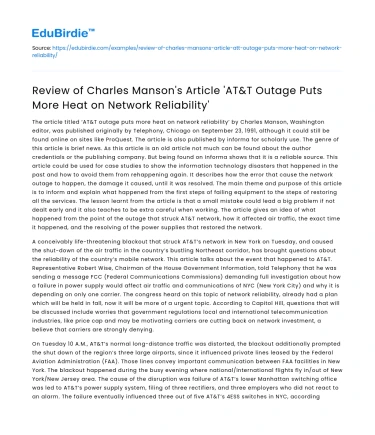The article titled ‘AT&T outage puts more heat on network reliability’ by Charles Manson, Washington editor, was published originally by Telephony, Chicago on September 23, 1991, although it could still be found online on sites like ProQuest. The article is also published by informa for scholarly use. The genre of this article is brief news. As this article is an old article not much can be found about the author credentials or the publishing company. But being found on Informa shows that it is a reliable source. This article could be used for case studies to show the information technology disasters that happened in the past and how to avoid them from rehappening again. It describes how the error that cause the network outage to happen, the damage it caused, until it was resolved. The main theme and purpose of this article is to inform and explain what happened from the first steps of failing equipment to the steps of restoring all the services. The lesson learnt from the article is that a small mistake could lead a big problem if not dealt early and it also teaches to be extra careful when working. The article gives an idea of what happened from the point of the outage that struck AT&T network, how it affected air traffic, the exact time it happened, and the resolving of the power supplies that restored the network.
A conceivably life-threatening blackout that struck AT&T’s network in New York on Tuesday, and caused the shut-down of the air traffic in the country’s bustling Northeast corridor, has brought questions about the reliability of the country’s mobile network. This article talks about the event that happened to AT&T. Representative Robert Wise, Chairman of the House Government Information, told Telephony that he was sending a message FCC (Federal Communications Commissions) demanding full investigation about how a failure in power supply would affect air traffic and communications of NYC (New York City) and why it is depending on only one carrier. The congress heard on this topic of network reliability, already had a plan which will be held in fall, now it will be more of a urgent topic. According to Capitol Hill, questions that will be discussed include worries that government regulations local and international telecommunication industries, like price cap and may be motivating carriers are cutting back on network investment, a believe that carriers are strongly denying.
Save your time!
We can take care of your essay
- Proper editing and formatting
- Free revision, title page, and bibliography
- Flexible prices and money-back guarantee
On Tuesday 10 A.M., AT&T’s normal long-distance traffic was distorted, the blackout additionally prompted the shut down of the region’s three large airports, since it influenced private lines leased by the Federal Aviation Administration (FAA). Those lines convey important communication between FAA facilities in New York. The blackout happened during the busy evening where national/international flights fly in/out of New York/New Jersey area. The cause of the disruption was failure of AT&T’s lower Manhattan switching office was led to AT&T’s power supply system, filing of three rectifiers, and three employers who did not react to an alarm. The failure eventually influenced three out of five AT&T’s 4ESS switches in NYC, according to AT&T spokesperson.
According to AT&T, on Tuesday 10 A.M. the problem began that caused failure to Thomas Street switching centre. The centre was switched to AT&T’s generated power from the Consolidated Edison commercial power supply. According to what AT&T said, during AT&T switched power, the rectifiers failed, which caused immediate switch to back-up batteries. Technicians overseeing the system did not see several alarms and did not go to assess the problem that would have enabled them to find the issue prior. Routinely, AT&T technicians try to convert back to commercial power at around 4:30 P.M., it is then when they find out about the failed rectifiers, which kept them from utilizing normal electrical power. The batteries that usually have life expectancy of six hours are nearly drained. About twenty minutes later around 4:50P.M. the batteries depleted. Workers who were solving the problem for three hours, 30% of services where restored. By midnight, mostly all services where restored, AT&T said.
The reliability of US’s telecommunication network was doubted again after a failure happened in AT&T equipment switches office in lower Manhattan. It was found out that the failure was due to an internal power supply system, failed rectifiers, and three employees not responding to alarm. Other than disrupting normal long-distance telecommunication traffic, it also affected private lines rented by the FAA, shutting New York three busy airports. Robert wise, is concerned FCC is not doing enough about US’s reliability and demanding full investigation. Other in Capitol Hill are worried government regulation of carriers are encouraging carriers to cut back on network investment.
This article is useful as it describes an disaster that it could be learnt from and avoided. It teaches us that we should be very careful and aware. If not, it could cause a disaster, as an example if the three technicians saw the alarm they could solve the issue. Another lesson it teaches us is that a small mistake could lead to a bigger mistake, for example the failed rectifier led to loss of telecommunications and disruption of air traffic. It also teaches us that we should not only depend on one support, if there was another support the air traffic could have functioned normally. There are some parts of this article I would recommend to change, first of there is not an exact date of when the event happened written in this article, it also does not talk about how it was resolved it only tells us about the time it was resolved. Overall, this is a good article for case study as it shows us the issue, human error, catastrophic disaster happened, and how it could be avoided.






 Stuck on your essay?
Stuck on your essay?

